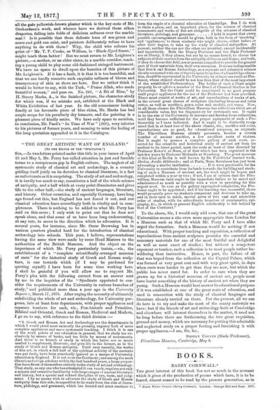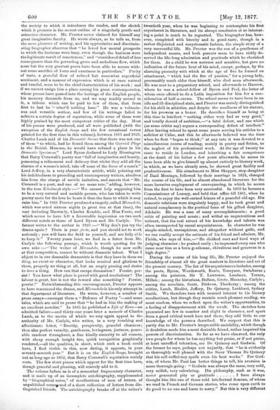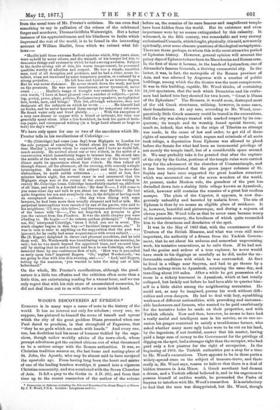BOOKS.
BARRY CORNWALL.* THE great interest of this book lies not so much in the account which it gives of the production of poems which have, it is to be feared, almost ceased to be read by the present generation, as in
• Bryan Wailer Procter (Barry Cornwall). London : George Bell and Bona. 1811.
the society to which it introduces the reader, and the sketch which it presents in the merest outline of a singularly gentle and attractive character. Mr. Procter never claimed for himself any great imaginative faculty. He wrote always, as he tells us, from the mere pleasure of writing, and his appreciative and discrimin- ating biographer observes that " he loved few mental prospects in which the horizons were hazy, even though the haziness were the legitimate result of remoteness," and "considered detail of less consequence than the pervading grace and melodious flow, which none but the very greatest poets have been able to secure with- out some sacrifice of force and exactness in particulars." Purity of taste, a graceful flow of refined but somewhat superficial sentiment, and a manner of expression which is at once natural and tuneful, seem to be the chief characteristics of his work ; and if we cannot assign him a place among his great contemporaries, whose poems have passed into the heritage of the English people, his memory demands from us, and we may readily accord to it, a tribute which can be paid to few of them, that from first to last he" utter'd nothing base." He was a volumin- ous and versatile author, and few of his writings failed to achieve a certain degree of reputation, while some of them were highly praised by the most competent critics of the day. Moat of his poems were produced, and all were published (with the exception of the English Songs and the few occasional verses printed for the first time in this volume), between 1815 and 1823. Charles Lamb said of his Dramatic Scenes that there was not one of them " to which, had he found theta among the Garrick Plays in the British Museum, he would have refused a place in his Dramatic Specimens." Lord Byron declared to Lady Blessington that Barry Cornwall's poetry was "full of imagination and beauty, possessing a refinement and delicacy that whilst they add all the charms of a woman's mind, take off none of the force of a man's." Lord Jeffrey, in a very characteristic article, while pointing out his indebtedness to preceding and contemporary writers, absolves him from the charge of servile imitation, and asserts that "Mr. Cornwall is a poet, and one of no mean rate," adding, however, in the true Edinburgh style :—" We cannot help supposing him to be a very natural and amiable person, who has taken to write poetry more for the love he bears it than the fame to which it may raise him." In 1821 Procter produced a tragedy, called Mirandola, which was acted sixteen nights (a great run at that time), the cast including Macready, Charles Kemble, and Miss Foote, and which seems to have left a favourable impression on two such different minds as those of Lord Byron and Mr. Carlyle. The former writes to the author in 1823 :—" Why don't you try the drama again ? There is your forte, and you should set to work seriously ; you will have the field to yourself, and are fully al.le to keep it." Twenty years later, we find in a letter from Mr. Carlyle the following passage, which is worth quoting for its own sake :—" The writer of Mirandula, though he now sniffs
at tbat composition, cannot be without dramatic talent. What I object to in our damnable dramatists is that they have in them no
thing, no event or character, that looks musical and glorious to them, properly no thing at all, but an empty prosing and desire to have a thing. How can that escape damnation ? Persist, per- sist I You know what place is paved with good resolutions ? The labour is great, but is not the reward also something ? Persist, persist !" Notwithstanding this encouragement, Procter appears to have renounced the drama, and Mirandola is his only attempt in
that department of literature. He wrote, however, a number of prose essays—amongst them a "Defence of Poetry "—and some tales, which are said to prove that "he had in him the making of
an excellent novelist." In 1835 he published a Life of Kean—an
admitted failure—and thirty-one years later a memoir of Charles Lamb, as to the merits of which we may again appeal to the authority of Mr. Carlyle, who writes, in a very touching and affectionate letter, " Brevity, perspicuity, graceful clearness ; then also perfect veracity, gentleness, lovingness, justness, peace- able candour throughout, a fine kindly sincerity to all comers, with sharp enough insight too, quick recognition graphically rendered,—all the qualities, in short, which such a book could
have, I find visible in this, now dating, it appears, in your seventy-seventh year." But it is on the English Songs, brought out as long ago as 1832, that Barry Cornwall's reputation mainly rests. The few short pieces which appear for the first time here, though graceful and pleasing, will scarcely add to it.
The volume before us is of a somewhat fragmentary character, and is made up of an incomplete autobiography, supplemented by "biographical notes," of recollections of men of letters, of unpublished renew and of a short collection of letters from dis- tinguished friends. The autobiography breaks off at the writer's
twentieth year, when he was beginning to contemplate his first experiment in literature, and its abrupt conclusion at so interest- ing a point is much to be regretted. The biographer has, how- ever, completed with brevity and in good-taste, though in a rather disjointed and unsystematic fashion, the simple story of a very uneventful life. Mr. Procter was the son of a gentleman of independent means, and both parents seem to have richly de- served the life-long admiration and gratitude which he cherished for them. As a child he was nervous and sensitive, but gave no indication of the future bent of his mind, except, perhaps, by the alarming precocity with which at the age of five he formed an attachment, " which had the fire of passion," for a young lady, presumably much older than himself, who died soon afterwards. He was sent to a preparatory school, and afterwards to Harrow, where he was a school-fellow of Byron and Peel, the latter of whom once offered to do a Latin imposition for him for a con- sideration of half-a-crown. The school seems to have been in an• idle and ill-disciplined state, and Procter was mainly distinguished for his skill in athletics, and despite the smallness of his stature, for his prowess as a boxer. He describes himself as being at this time in intellect " nothing either very bad or very good,' and totally devoid of ambition,—" a fatal defect, and one which (as some critics say) argues a corresponding defect of intellect." After leaving school he spent some years serving his articles to a solicitor at Calne, and this he afterwards believed was the time- when he first "began to think;" at any rate it was devoted to a miscellaneous course of reading, mainly in poetry and fiction, to the neglect of his professional work. At the age of twenty he came to reside in London, and inheriting a fair competence at the death of his father a few years afterwards, he seems to have been able to give himself up almost entirely to literary work, in which, as we have already seen, he showed great facility and productiveness. His attachment to Miss Skepper, step-daughter of Basil Montagu, followed by their marriage in 1824, changed the course of his life, and he almost abandoned literature for the more lucrative employment of conveyancing, in which he seems from the first to have been very successful. In 1832 he became a. Commissioner of Lunacy, and held that office till 1861, when he retired, to enjoy the well-earned leisure of a peaceful old age. His domestic relations were singularly happy, and he took great and natural complacency in the poetical fame of his gifted daughter, Adelaide. He was a man of many accomplishments ; a good critic of painting and music ; and withal so unpretentious and reticent, that the real extent of his knowledge and talents was often unsuspected by casual acquaintances. In character he was simple-minded, unsuspicious, and altogether without guile, and we can readily accept the estimate of his friend and admirer, Mr. Fields, who says of him,—" He disliked cant and hard ways of judging character ; he praised easily ; he impressed every one who came near him as a born gentleman; chivalrous and generous in a. high degree."
During the course of his long life, Mr. Procter enjoyed the friendship of almost all the great masters in literature and art of the present century. The list of his acquaintances includes, among the poets, Byron, Wordsworth, Keats, Tennyson, Swinburne among the painters, Sir T. Lawrence, Landseer, Turner, Millais ; among the historians, Hallam, Grote, Macaulay, Carlyle ; among the novelists, Scott, Dickens, Thackeray ; among the critics, Lamb, Hazlitt, Jeffery, De Quincey, Lockhart, Sydney Smith. We therefore turn with unusual interest to his literary recollections, but though they contain much pleasant reading, we must confess, when we reflect upon the writer's opportunities, to a feeling of disappointment with the rota The sketches here presented are few in number and slight in character, and apart. from a good critical touch here and there, they add little to our knowledge of the persons described. We suspect that this is partly due to Mr. Procter's irrepressible amiability, which though. it doubtless made him a most desirable friend, rather impaired his.
powers of discrimination. So far as we have observed, the only
two people for whom he has anything but praise, or if not praise,. at least unruffled toleration, are De Quincey and Godwin. Of the former he says, perhaps not unjustly, that "he is evidently so thoroughly well pleased with the Sieur Thomas De Quincey that his self-sufficiency spoils even his best works." For God- win, of whom Mr. Paul has better things to tell, his aversion is more thorough-going " Godwin was always the same, very cold, very selfish, very calculating. His philosophy, such as it was, never generated pity or gratitude I have always thought him like one of those cold intellectual demons, of whom we read in French and German stories, who come upon earth to do good to no one and harm to many." But this is very different from the usual tone of Mr. Procter's criticism. He can even find something to say in palliation of the crimes of the celebrated forger and murderer, Thomas Griffiths Wainwright. But a better instance of his appreciativeness and his blindness to faults which impressed the rest of the world, is to be found in the interesting account of William Hazlitt, from which we extract what fol- lows :- "Hazlitt held those extreme Radical opinions which, fifty years since, were upheld by many others, and the warmth of his temper led him to denounce things and systems to which he had a strong aversion. Subject to the faults arising out of this, his warm temperament, he possessed qualities worthy of affection and respect. He was a simple, unselfish man, void of all deception and pretence, and he had a clear, acute in- tellect, when not traversed by some temporary passion, or confused by a
strong prejudice He felt love and hatred in an intense degree. But he was never dishonest. He never struck down the weak, nor trod on the prostrate. He was never treacherous, never tyrannical, never cruel Hazlitt's range of thought was extensive. To use his own words, I have at least glanced over a number of subjects,—paint- ing, poetry, prose, plays, politics, Parliamentary speakers, metaphysical lore, books, men, and things.' This list, although extensive, does not designate all the subjects on which he wrote He himself had no books, and he never borrowed them except for temporary reference.
He drank water only and lived plainly With the exception of a very rare dinner or supper with a friend or intimate, his time was generally spent alone. After a late breakfast, he took his quire of fools- cap paper, and commenced writing (in a large hand almost as large as text) his day's work."
We have only space for one or two of the anecdotes which Mr. Procter tells in his recollections of Coleridge :—
" He (Coleridge) had come (one day) from Highgate to London for the sole purpose of consulting a friend about his son Hartley (' our dear Hartley '), towards whom he expressed, and I have no doubt felt, much anxiety. He arrived about one or two o'clock, in the midst of a conversation which immediately began to interest him. He struck into the middle of the talk very soon, and held the ear of the house' until dinner made its appearance about four o'clock. He then talked all through dinner, all the afternoon, all the evening, with scarcely a single interruption. He expatiated on this subject and that; he drew fine distinctions, he made subtle criticisms until at last, five minutes before eight, the servant came in and announced that the Highgate stage was at the corner of the street, and was waiting to convey Mr. Coleridge home. Coleridge immediately started up, oblivious of all time, and said in a hurried voice, ' My dear Z—, I will come to you some other day and talk to you about our dear Hartley.' He had quite forgotten his son and everybody else, in the delight of having such
an enraptured audience One day when dining with some lawyers, he had been more than usually eloquent and full of talk. His perpetual interruptions were resented by one of the guests, who said to his neighbour, 'I'll stop this fellow,' and thereupon addressed the master of the house with 'G—, I've not forgotten my promise to give you the extract from the Pandects. It was the ninth chapter you were alluding to. He begin' :—" Ac veteres quidam philosophi."' ' Pardon me, Sir,' interposed Coleridge, ' there I think you are in error. The ninth chapter begins in this way :—"Incident saepe causae, etc."' It was in vain to refer to anything on the supposition that the poet was ignorant, for be really had some acquaintance with every subject He (S. Rogers) delighted in clever and pleasant anecdotes, and he told them well. Mr. Wordsworth was breakfasting with him one morning, he said ; but he was much beyond the appointed time, and excused him- self by stating that he and a friend had been to see Coleridge, who had detained them by one continuous flow of talk. • How was it you called so early upon him ?' inquired Rogers. 'Ob,' replied Wordsworth, we are going to dine with him this evening, and—." And,' said Rogers, taking up the sentence, 'you wanted to take the sting out of him beforehand."
On the whole, Mr. Procter's recollections, although the good- nature is a little too effusive and the criticism often more than a little thin, are entertaining reading for a vacant hour, and we can only regret that with his rich store of accumulated memories, he did not deal them out to us with rather a more lavish hand.




































 Previous page
Previous page